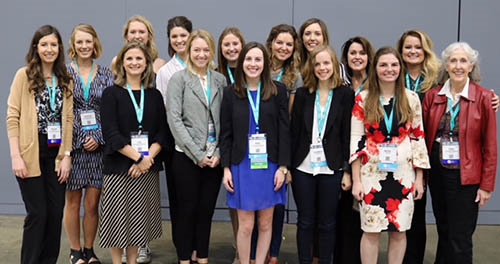
University of Arkansas students presented their Honors College research in communication disorders accompanied by their faculty mentors last month at the annual convention of the top professional association in their field.
Also at the meeting of the American Speech-Language Hearing Association in Los Angeles, two faculty members presented a poster on a project that was one of seven singled out from more than 600 in a news release from the association.
Kimberly Frazier, associate professor, and Rachel Glade, clinical assistant professor, presented “The Effects of Screen Technology Exposure on Executive Functioning and Social Skills in Children.” Kristin Higgins, associate professor of counselor education and Kristi Perryman, assistant professor of counselor education, collaborated on the research project but did not attend the convention.
The study investigated the effects of screen exposure on the executive functioning and social skills of children ages 9 to 11. Executive functioning is a key skill that allows children to perform and successfully complete tasks, which includes the ability to pay attention, manage emotions, multitask, and organize and plan. Although past studies have looked at the relationship between social skills and use of screen technology, this study is unique in that it also looks at executive function. The authors found that screen technology negatively affects both social performance and executive function. Based on their results, they recommend that parents limit the use of screen technology in children, particularly at times when children should be observing and participating in social interactions, such as family gatherings and at dinner.
Other research poster presentations by U of A students and faculty members:
- “Social-Emotional Learning in Users of Augmentative and Alternative Communication,” Katherine Branum and Frazier
- “Art as an Indicator of Non-Cognitive Persistence in Individuals Experiencing Dementia,” Rachel Dawson and Fran Hagstrom, assistant dean of the College of Education and Health Professions.
- “Comparison of National and International Technology Use by Adolescents with Down Syndrome and their Families,” Morgan Fritz, who graduated from the bachelor’s degree program and is now a master’s student at Auburn University, and Hagstrom
- “Dementia and Identity: Maintaining a Sense of Self Through Occupation,” Alanna Oliphant, Emma Allen and Hagstrom
- “Development of a Non-Cognitive (GRIT) Scale for Use with Infants and Toddlers,” Jane Justus and Hagstrom
- “EEG Time-Course Analysis of Sensori-Motor Mu Rhythm of Fluent Speakers and People Who Stutter,” Andrew Bowers, assistant professor of communication disorders, and others
- “Oscillatory Networks in Adults Who Stutter and Typically Fluent Speakers Under Phonological Working Memory Load,” Andrew Bowers, Lisa Bowers, assistant professor of communication disorders, and other
- “Family Dynamics in Auditory-Verbal Therapy,” Casey Baldwin, Lisa Bowers and Glade
- “Impact of a Peer Training on Judgments of Communication from Middle-School Students with Multiple Disabilities,” Christine Holyfield, assistant professor of communication disorders, and others
- “Reading is the Most Influential Life Skill: The Provision of Adapted Literacy Instruction by SLPs,” Holyfield and others
- “Augmentative and Alternative Communication Intervention Efficacy for Adolescents and Adults with Autism Spectrum Disorders,” Holyfield and other
- “American English Speakers’ Perception of Foreign Phonotactic Constraints: The Influence of Phonological Knowledge,” Bailey Pearson, who graduated from the bachelor’s degree program and is now a master’s student at the U of A, and Frazier
- “The Self-Perception of Social Skills for Children with ASD,” Megan Mikkelsen Frazier
- “The Self-Perception of Executive Functioning Skills for Children with ASD,” Lauren Phillips and Frazier
Fritz and Hagstrom also presented a flash session on “The Impact of Technology on Adolescents with Down Syndrome and their Families.”
More pictures are posted on the Facebook page of the College of Education and Health Professions.
Topics
Contacts
Heidi S. Wells, director of communications
College of Education and Health Professions
479-575-3138,